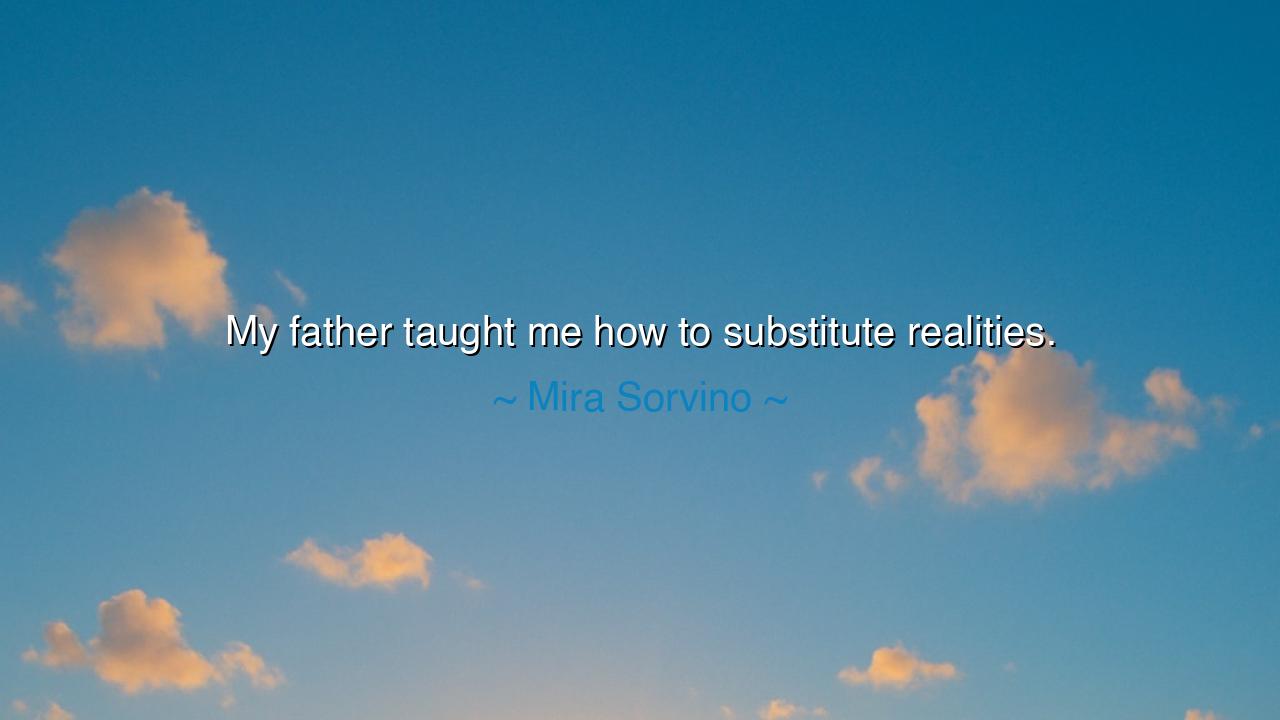
My father taught me how to substitute realities.






In the voice of reflection and legacy, Mira Sorvino once said: “My father taught me how to substitute realities.” Though spoken with simplicity, these words contain a profound wisdom — the understanding that life is not fixed to a single truth, that the mind and spirit have the power to reshape the world around them. It is a teaching that transcends the ordinary lessons of success or skill; it is the gift of imagination, of transformation, of learning to bend circumstance through inner vision. In this saying, Sorvino reveals the inheritance of not just craft, but of perception — for to substitute realities is to learn how to endure, to adapt, and to create meaning where none seems to exist.
To the ancients, this power of transformation was sacred. The poets called it metamorphosis; the philosophers called it transcendence. A man or woman who could alter the shape of their own reality was seen as one who carried divine fire. Mira Sorvino, the daughter of the renowned actor Paul Sorvino, speaks as one raised in both art and philosophy. Her father, himself a man of deep feeling and dramatic presence, did not merely teach her to act — he taught her to imagine. For an actor is not one who pretends, but one who lives within another’s soul. To substitute realities is to step beyond one’s own boundaries and inhabit the truth of another — to see the world through new eyes.
But this wisdom extends far beyond the stage. Life itself demands that we substitute realities, that we find courage to reshape what is given to us. There are times when the world feels harsh and unyielding, when pain and disappointment seem inescapable. In those moments, we must remember the power of the mind — the sacred ability to shift perspective. The soldier facing despair may substitute fear for duty; the mother in hardship may substitute struggle for purpose; the dreamer in darkness may substitute failure for preparation. In this way, the act of changing one’s reality is not illusion — it is strength. It is the alchemy of the soul.
Consider the story of Viktor Frankl, a man who survived the hell of concentration camps during the Second World War. He lost everything — family, freedom, and nearly life itself. Yet within that inferno, he discovered a truth that mirrors Sorvino’s words: that even in suffering, one may choose their reality. Frankl wrote that man’s last freedom is the ability to choose his attitude in any given circumstance. He learned to substitute despair with meaning, captivity with purpose, pain with understanding. His body was confined, but his spirit remained infinite. This, too, is the art of substituting realities — to see not what is, but what may yet be transformed.
For the artist, this power is the lifeblood of creation. To write, to act, to compose, to paint — all are forms of stepping between worlds, of reimagining existence. The father who taught Mira Sorvino this art gave her not only a profession, but a philosophy. He taught her that the boundaries of life are drawn not by fate, but by imagination. To substitute realities is to engage in divine play — to move from sorrow to song, from limitation to liberation. It is the secret by which humanity survives — for every invention, every revolution, every act of hope begins with one person daring to believe in a different world than the one before them.
But this lesson is not reserved for artists alone. It belongs to every soul who must rise after being struck down. When you face despair, remember that the mind can weave new meaning from the threads of loss. When life feels immovable, remember that reality is not a prison, but a mirror — and the reflection can change when the heart does. This is not denial, but transformation. It is not escape, but evolution. To substitute realities is to say, “This pain shall not define me; I will make of it something worthy.”
Let this be the wisdom carried forward: the power to substitute realities is the power to live freely. It is to understand that life is not what happens to you, but what you make of it — that the world outside is shaped by the world within. Mira Sorvino’s words remind us that the greatest inheritance a parent can give is not wealth or fame, but perspective — the courage to imagine beyond the visible, to transform sorrow into art, fear into faith, and limitation into possibility.
Thus, the teaching concludes: the soul that can substitute realities is indestructible. When one reality ends, it creates another. When hope falters, it is reborn through vision. Remember this — that you, too, are an artist in the theater of life. And when the stage grows dark, as it must at times, do as the wise have done: substitute your reality — and light a new dawn from within.






AAdministratorAdministrator
Welcome, honored guests. Please leave a comment, we will respond soon